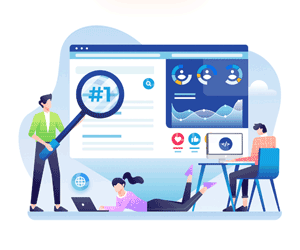With rapid evolution of AI Technology, AI-driven systems have become increasingly popular and capable of replacing human interactions in various online support scenarios, thus in demand. These advanced AI systems are designed to provide instant assistance to users across a wide range of matters, ensuring seamless and efficient communication.
When a user visits a website in search of information or relevant products, AI-powered software actively analyzes their online behavior, including browsing patterns, search queries, and preferences. By leveraging machine learning algorithms and natural language processing (NLP), the AI can quickly interpret the user's intent and provide personalized recommendations, product suggestions, or guidance tailored to their needs.
Such AI-driven interactions not only enhance user experience by offering real-time support but also improve efficiency for businesses by reducing response times and minimizing the need for human intervention. Whether it's resolving customer queries, guiding users through a purchasing process, or providing troubleshooting support, AI systems continuously learn and adapt to deliver more accurate and context-aware assistance.
As AI technology continues to advance, these intelligent systems will become even more intuitive, making online interactions smoother, more engaging, and highly efficient, ultimately revolutionizing the way users access information and receive support in the digital landscape.
Are you wondering to know what is this? This is an AI Chatbot.
AI chatbots are everywhere these days. You might find them on websites, in apps, and even in your smart home devices. Whether you’re shopping online, looking for customer support, or even booking an appointment, chances are you’ve interacted with an AI chatbot without even realizing it.
What Are AI Chatbots?
An AI chatbot is a computer program designed to have conversations with people. It uses artificial intelligence to understand what you’re saying and respond in a helpful way. Think of it like a virtual assistant that is available 24/7 to answer questions, guide you through processes, or even entertain you. While chatbots have limitations, they are constantly evolving and becoming more advanced.
However, if you want to emphasize advanced capabilities like behavioral analysis, personalized recommendations, and adaptive learning, you might also use terms like:
- AI Virtual Assistant – for a more human-like, interactive experience.
- Conversational AI – for a chatbot that engages in more dynamic, context-aware conversations.
- AI Customer Support System – for a chatbot specifically designed to assist customers.
The term AI Chatbot is widely recognized, but if your system is more sophisticated than a typical rule-based chatbot, you might prefer a more descriptive name.
How Do AI Chatbots Work?
Have you ever wondered how these chatbots actually work? How do they understand your questions and respond so quickly? More importantly, why are they becoming so popular? In this blog, we’ll explore everything you need to know about AI chatbots in simple terms.
AI chatbots use something called Natural Language Processing (NLP) to understand and respond to human language. Here’s a simple way to think about it:
- Understanding: The chatbot receives a message from you and tries to understand what you’re asking. It breaks down the sentence and looks for keywords and context.
- Processing: It uses its AI brain to figure out the best response. This might involve looking up information or using pre-programmed responses.
- Responding: The chatbot sends a reply back to you, aiming to be as helpful and accurate as possible.
- At Customer Service Portal: Many companies use chatbots on their websites to answer common questions, help with orders, or provide support.
- E-commerce: Online stores use chatbots to help customers find products, make recommendations, and complete purchases.
- Healthcare: Some chatbots can provide medical information, help schedule appointments, or even offer mental health support.
- Education: Schools and universities use chatbots to answer student questions, provide study tips, and assist with enrollment.
- 24/7 Availability: Chatbots are always online, so you can get help anytime you need it.
- Speed: They can quickly provide answers, which is great for users in a hurry.
- Consistency: Chatbots give the same answers every time, ensuring reliable information.
- Cost-Effective: Businesses save money by using chatbots to handle routine tasks, freeing up human employees for more complex work.
- Understanding Complex Queries: Sometimes, chatbots struggle with complicated or unusual questions.
- Lack of Human Touch: Chatbots can’t always provide the empathy and personal touch that a human can.
- Dependence on Data: Chatbots need a lot of data to learn and improve, which can be a challenge for new businesses.
- Better Understanding: Improved NLP will help chatbots understand and respond to more complex queries.
- More Human-Like Interaction: Chatbots will get better at mimicking human conversation, making interactions feel more natural.
- Integration with Other Technologies: Chatbots will work more closely with other AI technologies, like voice assistants and smart devices.








 June 27, 2024
June 27, 2024











